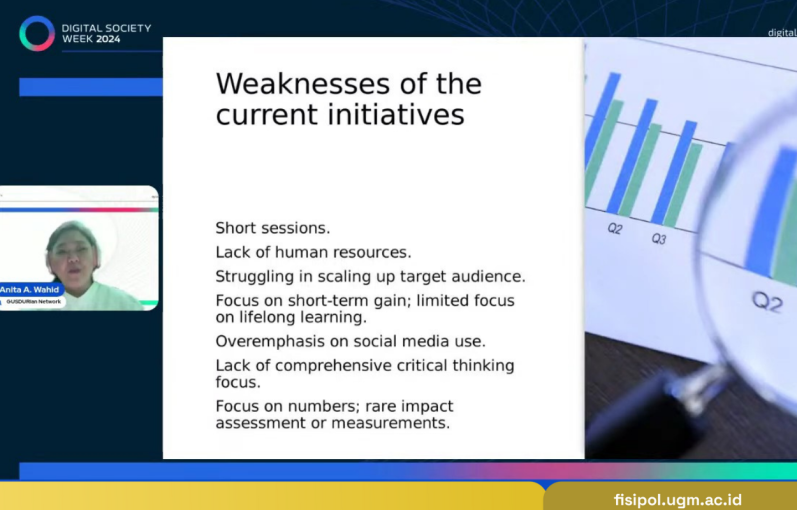
Yogyakarta, October 8th 2024─Digitalization has created a new space as well as disruption in society. The development of digital technology continues to accelerate without being accompanied by community readiness. The Center for Digital Society explored the issue during the 5th day of Digital Society Week 2024 on Monday (8/10). The panel discussion raised three main topics with experts, namely the adoption of new technologies, mitigation of misinformation, and digital literacy.
The problem of community readiness to face digital development is not only faced by Indonesia as a developing country. Developed countries such as the UK also do not have a patent framework to improve the digital literacy of their people. This was mentioned by Luthfi Baihaqi Riziq, Research Assistant at CfDS in a panel entitled “Digital Literacy and Readiness to Adopt New Technology in Indonesia”.
“Only 2% of UK students are able to identify misinformation. So far they have implemented it in the curriculum, that’s what the government claims. But most teachers feel that this is not enough to equip students with digital literacy,” Luthfi explained. The unpreparedness of people’s digital literacy has led to a decline in trust in news media in the UK.
Unlike the UK, Luthfi continued, Canada has a more decentralized framework. Although neither has a framework for improving people’s digital literacy, each government territory is actively engaged in “digital literacy”. These initiatives emerge organically in communities and are based on peer to peer learning. Non-profit organizations and networks of educators are also collaborating so that school learning continues to evolve through the digital landscape.
In Indonesia, the Merdeka Curriculum provides learning flexibility for students. Digital literacy can be an option in any learning, as long as it remains relevant to the main material. Unfortunately, there is a high possibility of implementation with different standards due to the lack of knowledge of teachers in providing digital literacy materials. Hilman Nurjaman, who is also a CfDS researcher, responded to the issue with opportunities for AI implementation.
“Countries such as Finland and America have made extensive use of AI in e-learning. In Indonesia, of course, we have to pay attention to equal digital access,” said Hilman. AI might be one method to provide material on digital literacy. But it is also necessary to pay attention to the conditions of digital equity in remote areas. Do not let when AI is applied in education, many students feel left behind and neglected because they cannot follow the learning process.
In addition to the urgency of education, digital literacy is also important to prevent the public from misinformation and hoaxes. The issue was discussed in panel two titled “Rethink Digital Literacy Strategies to Mitigate Misinformation and Disinformation” by Anita Ashvini Wahid, Digital Democracy Activist. According to her, the spread of misinformation and hoaxes occurs progressively and cannot only be handled by one party.
“If we go back to the 2024 elections, we can see how we faced forms of misinformation that were much more varied than the framework we had prepared,” Ashvini said. Policies are required to be responsive and reactive to all changes. One of the things Ashvini believes can be done is to build a culture of literacy in the younger generation. This strategy encourages the formation of a society that is strong in literacy and immune to misinformation.
Digital Society Week 2024 by CfDS of Faculty of Social and Political Sciences UGM is intended not only as a forum for discussion of technological developments, but also to provide space for the community to understand the importance of digital literacy in readiness to face digitalization and create a safe digital space.
